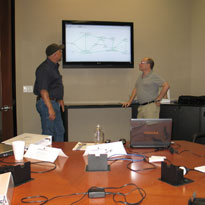MPLS
- Course:MPLS
- Course ID:MPLS Duration:2-3 days Where: Your Office (7+ Persons)
- Download Course Description (PDF)
Available as a private, customized course for your group at your offices or ours and in some cases as a WebLive(TM) class.
Course Outline
- Overview of Routing and MPLS
- Layer 3 Routing
- Native Hop-by-Hop Network Layer Routing
- Next Hop Selection Functions
- Label Switching
- MPLS Forwarding Paradigm
- Integration of IP and ATM
- Advantages of MPLS Forwarding over Conventional Network Layer Forwarding
- Why MPLS?
- Label Switch Routers (LSRs)
- LSR Basics
- ATM LSRs
- LSR Routing Operation
- MPLS Labels
- MPLS Labels Basics
- Label Encapsulation
- Label Assignment and Distribution
- Upstream and Downstream LSR
- Label Distribution: Purpose
- Label Distribution: Protocols
- Label Distribution: Methods
- Label Retention Modes
- Label Switched Path (LSP)
- LSP Setup Control
- Route Selection
- Basics
- Standard IP and MPLS
- IP Forwarding
- MPLS Label Distribution
- Label Switched Path (LSP)
- Explicitly Routed LSP (ER-LSP): Basics, Example, Advantages
- Hop-by-Hop versus Explicit Routing
- MPLS Architecture
- MPLS Operation
- MPLS Node Architecture
- MPLS Elements
- Loop Survival, Detection, and Prevention in MPLS
- Virtual Private Networks (VPNs) and MPLS
- Overview of VPNs
- Connection-Oriented VPNs
- Connectionless VPNs
- Comparison of VPN Technologies
- MPLS VPN Operation
- Layer 2 MPLS VPNs
- Layer 3 MPLS VPNs
- Route Reflectors
- Trace Route Enhancements
- Advantages of MPLS VPNs
- MPLS VPN Management
- MPLS Traffic Engineering
- The Need for Traffic Engineering on the Internet
- Unequal-Cost Load Balancing via Metric Manipulation
- Advantages of MPLS Traffic Engineering
- MPLS Traffic Engineering Elements (Dynamic/Static LSPs)
- MPLS Traffic Engineering Configuration
- Configuration Case Study of an MPLS Traffic-Engineered Network (IS-IS)
- Configuration Case Study of an MPLS Traffic-Engineered Network (OSPF)
- MPLS and Quality of Service (QoS)
- Introduction to Quality of Service
- Overbuild vs. Preferential Treatment of Packets
- Integrated Services
- IP Precedence
- Differentiated Services
- Modular QoS CLI
- MPLS Implementation of DiffServ
- MPLS VPN Support of QoS
- MPLS QoS Implementation
- Configuring QoS for MPLS VPNs
- MPLS QoS Case Study
- MPLS Design
- MPLS VPN Design and Topologies
- Designing MPLS Networks
- Additional MPLS Design Considerations
- MPLS and Emerging Technologies
- Control Planes and MPLS
- Fixing the Problems of SONET
- Generalized MPLS (GMPLS) and Automatic Switched Optical Network (ASON)
- Separation of Connectivity and Services: Next Generation Network (NGN)
- Getting Rid of SONET: MPLS and Optical Transport Network (OTN)
- MPLS and Emerging Very High Speed Ethernet (>100 Mb/s)
- New Architectures for Layer 2 Functionality
- Virtualization and Software Defined Networking (SDN)
- Network Functions Virtualization (NFV) and MPLS
- Conclusion: Recap, Q/A, and Evaluation
Course in a Nutshell
This course provides an in-depth study of MPLS, including the theory and configuration, network design issues, operations, VPN, traffic engineering, and GMPLS. We will start with an overview of conventional routing and how it compares to MPLS routing. We will then learn the underlying concepts, features, functions, benefits, and applications of MPLS. We will also study the frame-mode and cell-mode MPLS, the concept of MPLS labels, label stack and different label formats, the label distribution process between LSRs, the loop detection and prevention mechanisms in MPLS, MPLS architecture, MPLS VPN, MPLS QoS, and MPLS traffic engineering. We will conclude with an exploration of the future trends related to the MPLS technology.
Customize It!
Customize this course to your specific needs at no additional cost. We offer distinct versions tailored for network design engineers, equipment or application designers, and less technical audiences such as managers, executives, business planners, sales and marketing specialists, and operations and support personnel. If your audience is unfamiliar with IP, you may extend the course to three days to include an up-front review of the IP protocol.
Learn How To
Upon course completion, you will be able to:
- Describe the features, functions, and benefits of MPLS
- Identify suitable applications for MPLS
- Explain the underlying concepts of MPLS
- Elaborate on the frame-mode MPLS and cell-mode MPLS
- Describe the concept of MPLS labels, label stack and different label formats
- Describe the label distribution process between LSRs
- Describe the loop detection and prevention mechanisms in MPLS
- Describe the QoS mechanisms in MPLS
- Describe the VPN in MPLS
- Explain how MPLS will interact with emerging technologies
Aimed At
Those with a technical background who are familiar with data networking concepts and have the need to understand the evolving MPLS-based systems.
Prerequisites
Familiarity with data networking and IP protocol concepts. For those unfamiliar with IP, the course can be extended to three days to include a review of the IP background.
- "Encompassed a large amount of info that gave us a good overview of all topics we would need to create a working set-up. The instructor was knowledgeable on the subject and conveyed the material in a way that was easy to learn, even with limited background in the specific area. The class materials will provide a good reference when configuring MPLS. Overall, I'm very satisfied with the class; it has left me with a good understanding of MPLS and will help in actually configuring MPLS." – Network Administrator, US Competitive Local Exchange Carrier

